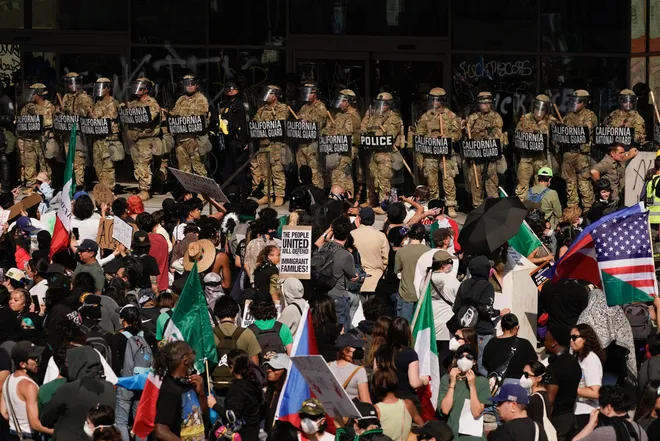A wave of Immigration and Customs Enforcement (ICE) raids carried out across Los Angeles on Sunday has sparked immediate protests and widespread condemnation from immigrant rights advocates, local leaders, and civil liberties groups. The coordinated operation, which ICE says targeted individuals with final removal orders or criminal records, has raised fears of increased deportations and racial profiling across the region.
According to ICE officials, over 150 individuals were detained in what the agency described as a “targeted enforcement action” focused on non-citizens who had exhausted legal remedies. The raids were executed in multiple neighborhoods, including Boyle Heights, South Central, and the San Fernando Valley, beginning early Sunday morning and continuing into the afternoon.
Witnesses reported agents arriving in unmarked vehicles and conducting door-to-door searches, sometimes in residential apartment buildings. In several cases, videos circulated online showing people being taken into custody without clear identification or warrants, raising questions about the legality of some operations.
Protests erupted almost immediately, with demonstrators gathering outside the Los Angeles ICE field office and City Hall by midday. Chants of “No human being is illegal” and “Abolish ICE” echoed through downtown streets as advocacy groups demanded a halt to the raids and the release of detainees. Some protesters attempted to block detention vans, resulting in several nonviolent confrontations with local police.
Los Angeles Mayor Karen Bass issued a statement Sunday afternoon criticizing the raids as “aggressive and unnecessary,” and reaffirmed the city’s commitment to sanctuary policies. “This operation undermines the trust between immigrant communities and law enforcement. We were not notified, and we do not support these tactics,” she said.
Governor Gavin Newsom also responded, calling for an immediate federal review of ICE practices. “California will not be complicit in actions that target families and create fear in our neighborhoods,” Newsom stated, adding that the state’s legal aid network was mobilized to assist those affected.
The Department of Homeland Security defended the operation, stating that all individuals detained had been identified through legal processes and that community safety was a priority. A spokesperson said that sanctuary policies “do not exempt anyone from immigration law” and that ICE had acted within its mandate.
Civil rights organizations, including the ACLU of Southern California and United We Dream, condemned the raids as part of a broader campaign of intimidation. They urged the Biden administration to halt interior enforcement actions and focus on comprehensive immigration reform.
The raids come amid a heated national debate over border security, undocumented immigration, and asylum policy. While the Biden administration has maintained a more moderate tone than its predecessor, critics argue that ICE has continued controversial enforcement actions largely unchanged.
Legal observers say that Sunday’s events may trigger a series of lawsuits, especially if reports of warrantless entries or unlawful detentions are verified. Immigration lawyers in Los Angeles have already begun organizing emergency response teams to visit detention centers and provide legal support.
By Sunday evening, protests had spread to other major cities, including San Francisco, Chicago, and New York, where organizers called for nationwide demonstrations and congressional action to limit ICE’s authority.
As of Monday morning, ICE had not released an official list of those detained or their current locations. Advocates fear that many could be swiftly transferred to out-of-state facilities, limiting their access to legal representation and family contact.
The aftermath of the raids has intensified calls for local and national leaders to reevaluate immigration enforcement policies and prioritize humane treatment and due process. For now, Los Angeles remains at the center of a growing firestorm over the role of federal immigration authorities in American communities.
Source; USA Today



